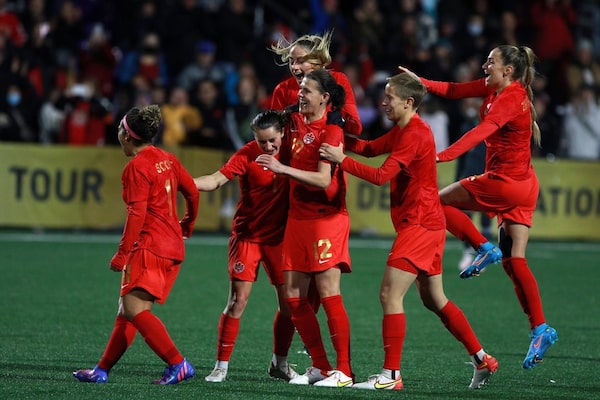
The Canadian women's team have participated in seven consecutive World Cups (out of eight) and reached the quarter-finals in 2015The Canadian Press
Canada’s national soccer team is one to watch in this year’s FIFA Women’s World Cup, taking place in Australia and New Zealand. Not only did the women win gold at the 2020 Tokyo Olympics, the team came in second in the 2022 CONCACAF W Championship, and is led by the sport’s most prolific scorer – Christine Sinclair.
Off the field, the players have been at the centre of a labour dispute for months, declaring that Canada Soccer, the sport’s governing body, had failed to support the national women’s program to the same degree it supports the men’s program. The team briefly went on strike in February before Canada Soccer’s threats of legal action forced it back onto the pitch.
Unlike the men’s team, which only returned to the World Cup last year after four decades, this team is an experienced powerhouse. The women have participated in seven consecutive World Cups (out of eight), and reached the quarter-finals in 2015.
Where is the 2023 World Cup taking place?

The Sydney Opera House and Sydney Harbour ahead of the FIFA World Cup.Lewis Storey/Getty Images
Australia and New Zealand are jointly hosting the tournament. This is the first time the Women’s World Cup is being held in multiple countries and the first one held in the Southern Hemisphere. For Canadians, this means staying up late or waking up early on a few occasions, but hey, this only happens once every four years.
When does the World Cup start and what’s the schedule?
The World Cup kicked off on July 20 with New Zealand facing off with Norway. The group stage runs from July 20 to Aug. 3, followed by the round of 16, quarter-finals, semi-finals and the final.
The full schedule is:
- Group stage: July 20 to Aug. 3
- Round of 16: Aug. 5 to Aug. 8
- Quarter-finals: Aug. 11 and 12
- Semi-finals: Aug. 15 and 16
- Third-place match: Aug. 19
- Final: Aug. 20
What’s the group stage?
During the group stage, 32 national teams compete in groups of four for their spot in the knockout round. It’s the first time that 32 teams are competing in the women’s championship, up from 24 teams at the previous event. The top two teams from each of the eight groups move on to the next phase.
Fill out your FIFA World Cup bracket
Canada, which is seventh in the FIFA rankings, plays in group B against Australia (ranked 10th), Nigeria (ranked 40th), and Ireland (ranked 22nd).
Group A: New Zealand, Norway, Philippines, Switzerland
Group B: Australia, Canada, Nigeria, Ireland
Group C: Costa Rica, Japan, Spain, Zambia
Group D: China, Denmark, England, Haiti
Group E: Netherlands, Portugal, United States, Vietnam
Group F: Brazil, France, Jamaica, Panama
Group G: Argentina, Italy, South Africa, Sweden
Group H: Colombia, Germany, South Korea, Morocco
When is Canada scheduled to play in the World Cup?
Canada has three matches in the group stage between July 20 and July 31:
- Nigeria vs. Canada: Thursday, July 20 at 10:30 p.m. ET. Final score: Tie game, 0-0.
- Canada vs. Ireland: Wednesday, July 26 at 8 a.m. ET. Final score: Canada wins, 2-1.
- Canada vs. Australia: Monday, July 31 at 6 a.m. ET
If Canada makes it out of the group stage, its first knockout match will be on Monday, Aug. 7.
How can Canadians watch the World Cup?
Canadian fans can watch on TSN, and some matches will be available on CTV. This includes all three of Canada’s group-stage matches. French-language coverage will be on RDS. Check out more information about viewing options here.
Who are the favourites?

The U.S. won the Women's World Cup in 2019.Alessandra Tarantino/The Associated Press
The U.S. national team, which sits at the top of the FIFA rankings and has already won four World Cups, is this year’s favourite despite recent injuries. They won their first match against Vietnam, 3-0.
Other teams to watch include two-time winner Germany, ranked second, third-ranked Sweden, and Canada, following its gold-medal win at the Tokyo Games.
How much do the players earn?
For the first time, every player at the Women’s World Cup will be paid at least US$30,000. A group of players asked FIFA last year to increase the prize money for the tournament and sought a guarantee that a percentage of the prize pool would go directly to the players. In response, FIFA raised the prize pool by more than three times from the 2019 total and agreed that a chunk of those funds will go to the players.
Each player’s remuneration will increase the further teams progress. The 23 players in the title-winning squad will earn US$270,000 each.
The amount is significant. FIFA released a report last year showing that the average annual salary for players on women’s teams was US$14,000.
In total, the fund for this World Cup has increased to US$152-million from US$40-million in 2019. Despite these changes, FIFA is still miles away from pay-equity territory: The prize-money pool for the men’s World Cup last year was US$440-million.
Who’s on Canada’s squad?
Canada coach Bev Priestman chose her final roster on July 9, acknowledging wins and losses on the injury front. Canada’s 23-player roster is a mix of veterans and new players, with ages ranging from 18 to 40.
Captain Sinclair will be taking part in her sixth World Cup alongside other veterans including Sophie Schmidt, Kadeisha Buchanan, Ashley Lawrence, Jessie Fleming, Allysha Chapman, Adriana Leon, Nichelle Prince, Shelina Zadorsky and Quinn, who goes by one name.
Youngsters on the roster include 18-year-old midfielder Olivia Smith and 19-year-old midfielder Simi Awujo, neither of whom were born when Sinclair scored her first goal for Canada in March, 2000 at the Algarve Cup.
Seventeen of the 23 players were on the 2019 World Cup roster.
Who is Christine Sinclair?
Sinclair, 40, from Burnaby, B.C., is likely playing in her final World Cup and is one of the players to watch.

Christine Sinclair is the world's all-time leading scorer in soccer.Naomi Baker - FIFA/Getty Images
She is international soccer’s leading scorer, among women or men, with 190 goals, and widely regarded as the face of soccer in Canada and one of the country’s greatest athletes.
Off the field, she has led the team in its battle for equal pay. In March, she testified on Parliament Hill along with several team members, expressing frustration over their long fight to achieve gender equality in the sport and calling out Canada Soccer for a “culture of secrecy and obstruction.”
With reports from The Canadian Press.
 Mathilde Augustin
Mathilde Augustin